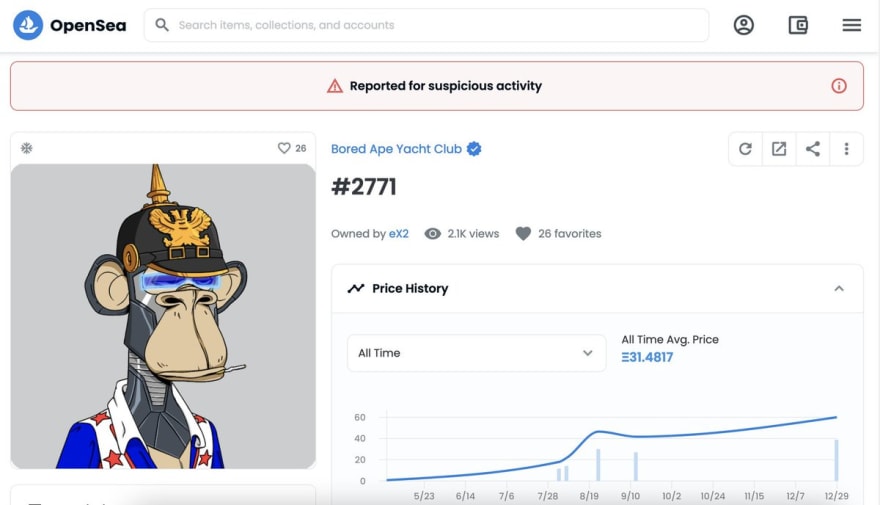Web3 is an architecture and set of patterns for building distributed systems. Some of those patterns are implemented by different infrastructure components at different layers of the stack. Web3 will not solve society's problem similar to how AI did not solve our problems, but offers a new way to build applications. This post will touch on 3 common criticisms I hear when developing Web3 applications.
Anti Network Effects
The early adopters that get in early need to sell their tokens to new comers at higher prices to make a profit. Not everyone wants to do that so they will make their own coin which sometimes will be a scam.
 zerohedge@zerohedge
zerohedge@zerohedge 'Squid Game' Crypto-Scam Exposed, COIN Crashes 100% After Explosive Gains zerohedge.com/crypto/squid-g…17:34 PM - 01 Nov 2021
'Squid Game' Crypto-Scam Exposed, COIN Crashes 100% After Explosive Gains zerohedge.com/crypto/squid-g…17:34 PM - 01 Nov 2021
These anti patterns of jumping to coin to coin are not a sustainable roadmap for building applications. The desire to get in early and for coins to moon is for speculation and not builders. Builders are focused on protocols and services that provide value to their customers and will focus their energy in building systems. Just how their are scams and fraud in web2, moving to a new paradigm does not remove societal problems. The builders will continue to build and scammers will continue to scam, what we can do as a community is educate how to detect scams and protect your assets. I reckon a Gmail style "filter" will emerge that can automatically block out illegitimate projects in the near future.
"Decentralization"
A key concept for web3 is having decentralized protocols to build with. While not having to solely rely on a 3rd party, you give up the aspect of responsibility. If your AWS account gets hacked and you get a massive bill, they can waive the fee for you and you can upgrade your account security. But if an NFT gets stolen or wallet comprised your are out of luck... in theory. Centralized services are already here in the in web3 space such as OpenSea and Coinbase. These entities already take the onus responsibility in certain use cases such as a "stolen" NFT.

 Nikita@nikitabier
Nikita@nikitabier If centralized marketplaces can flag & block “stolen” NFTs—effectively delegitimizing the ledger—then what’s the point of the blockchain?
If centralized marketplaces can flag & block “stolen” NFTs—effectively delegitimizing the ledger—then what’s the point of the blockchain?
The end state of decentralized protocols will likely be the same system we have today: banks reversing transactions they deem illegitimate.06:41 AM - 04 Jan 2022
Guard rails must be in place for developers to want to build. The centralized services will be offering guard rails which will also improve developer experience. Think of services such as Steam and Netflix that provide a centralized experience for games and movies. As much as we may hawk about decentralized, when something goes wrong we want to blame someone and having central players gives us the confidence to build.
What data goes on chain?
"If you ask 10 developers to architect a system that leverages blockchain, you will get 10 different responses on how to build the system" - Aaron Levie CEO Box
Storing data on chain is expansive and is not better than using stand SQL databases of "web2". So this begs the question why should we even us blockchain then?
Blockchains provide a new way to build networks that combines the publicly-owned network effects of web1 with the advanced functionality of web2.
People will point to blockchain technology & argue its inefficiencies when compared to traditional high throughput databases.
The real comparison should be between highly inefficient & expensive intermediaries like banks, lawyers, art brokers, governments, & stock exchanges.04:14 AM - 05 Feb 2022
This allows blockchains to act as public goods rather than private entities. In terms of what should be stored...
The least amount of information possible, in the most efficient way possible, should be stored on the blockchain
Blockchains at is core is about developing a system of trust. In the end a human must verify the data on chain. Sentiment such as "code is law" fall apart as soon as bugs or errors are introduced. Having a way for a human to verify the hash of data provides a mechanism for humans to understand data stored on chain for applications.
Conclusion
We are still early... and we are "flying the airplane while building it". It is important to remember that web3 does not solve societal problems and centralization is not inherently bad. Its up to use the builders to architect systems that humans can trust and develop applications we enjoy using.










Top comments (0)